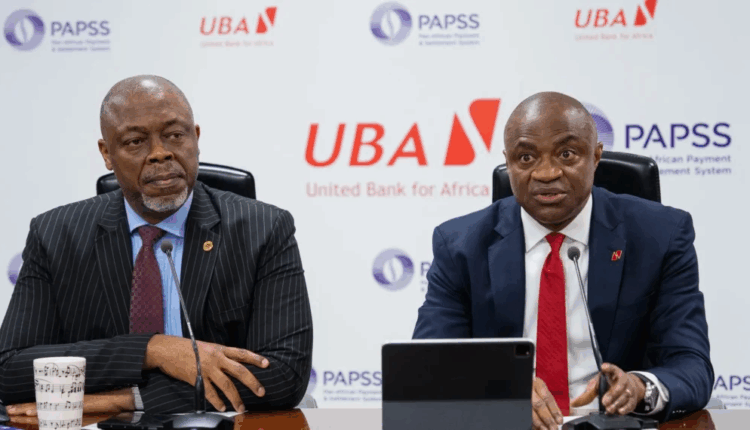The United Bank for Africa (UBA) has partnered with the Pan-African Payment and Settlement System (PAPSS) to transform cross-border transactions through the integration of UBA’s artificial intelligence-powered chatbot, LEO.
This initiative aims to make intra-African trade more secure, convenient, and affordable, addressing long-standing payment challenges that have hindered economic integration across the continent.
The collaboration marks a significant step towards realising the vision of a unified African trade market, a dream rooted in the early ambitions of the Organisation of African Unity (OAU). By combining LEO’s accessibility with PAPSS’s instant payment capabilities, the project seeks to bridge the gap between African nations in financial connectivity.
Speaking at a press conference, Oliver Alawuba, UBA’s Group Managing Director and CEO, highlighted that despite Africa’s close-knit geography, the cost and complexity of transactions remain a major obstacle to trade.
“Whether you’re in Burkina Faso or in Guinea or in Liberia or Cameroon, we need to do a lot more business with each other,” Alawuba remarked, emphasising the need for a payment system that is secure, affordable, and trustworthy.
LEO is backed by a robust security framework, leveraging UBA’s operational experience in multiple African countries. The chatbot incorporates encryption and personal identification safeguards to protect user access and transaction integrity. Alawuba proudly noted that the platform has processed countless transactions “without one single issue,” underscoring its reliability.
One of LEO’s biggest strengths lies in its ease of use. Designed to appeal to younger, tech-savvy users, the chatbot operates seamlessly on popular messaging platforms such as WhatsApp, Facebook, and Messenger. Its minimal data requirements make it widely accessible, even in regions with limited internet connectivity.
The partnership’s initial rollout focuses on the Ghana-Nigeria trade corridor, a vital commercial route. However, Alawuba revealed plans for expansion to other strategic corridors, including the Abidjan-Ouagadougou and Mano River routes, enhancing trade connectivity across West Africa.
Mike Ogbalu, CEO of PAPSS, hailed the collaboration as a pivotal milestone in the push to strengthen intra-African commerce. Describing UBA as “one of the first banks to integrate into the PAPSS core,” Ogbalu stressed that PAPSS is built to global standards, with governance led by African central banks.
The platform’s capabilities are impressive — transactions are completed in just seven seconds, a stark contrast to the days-long settlement times that once slowed trade and business growth. Ogbalu likened the shift to the move from three-day cheque clearance to same-day transactions, saying, “What PAPSS does is to bring about instant payment.”
Perhaps most striking is the reduction in transaction costs. Cross-border payments that previously cost around $25 can now be processed for as little as $2, with an average fee of just 0.1% per transaction. This dramatic cut is expected to stimulate trade volumes and promote affordability for businesses and individuals alike.
By integrating PAPSS with LEO on platforms like WhatsApp and Facebook, the partnership aims to reach a vast audience — particularly Africa’s youth, who are leading the charge in digital adoption. This approach combines convenience with trust, encouraging more people to engage in cross-border trade.
Regulatory alignment is also playing a key role. Ogbalu pointed to recent changes by the Central Bank of Nigeria (CBN), which have eased documentation requirements for transactions under $2,000 for individuals and $5,000 for businesses, paving the way for faster adoption.
Beyond payments, PAPSS is already exploring new technologies to further strengthen Africa’s financial independence. Ogbalu revealed that the organisation is assessing opportunities in the stable coin space and has launched a blockchain-based African currency marketplace. This platform allows companies to trade currencies directly, reducing reliance on foreign currencies for intra-African trade.
The strategic partnership between UBA and PAPSS signals a new era for African commerce, where secure, instant, and low-cost cross-border transactions could become the norm.
By merging technological innovation with a pan-African vision, the initiative promises to break down the financial barriers that have long constrained the continent’s economic potential.
With its initial steps already underway, the LEO-PAPSS integration could be the turning point that moves Africa closer to a fully connected and economically empowered future.


Comments are closed.